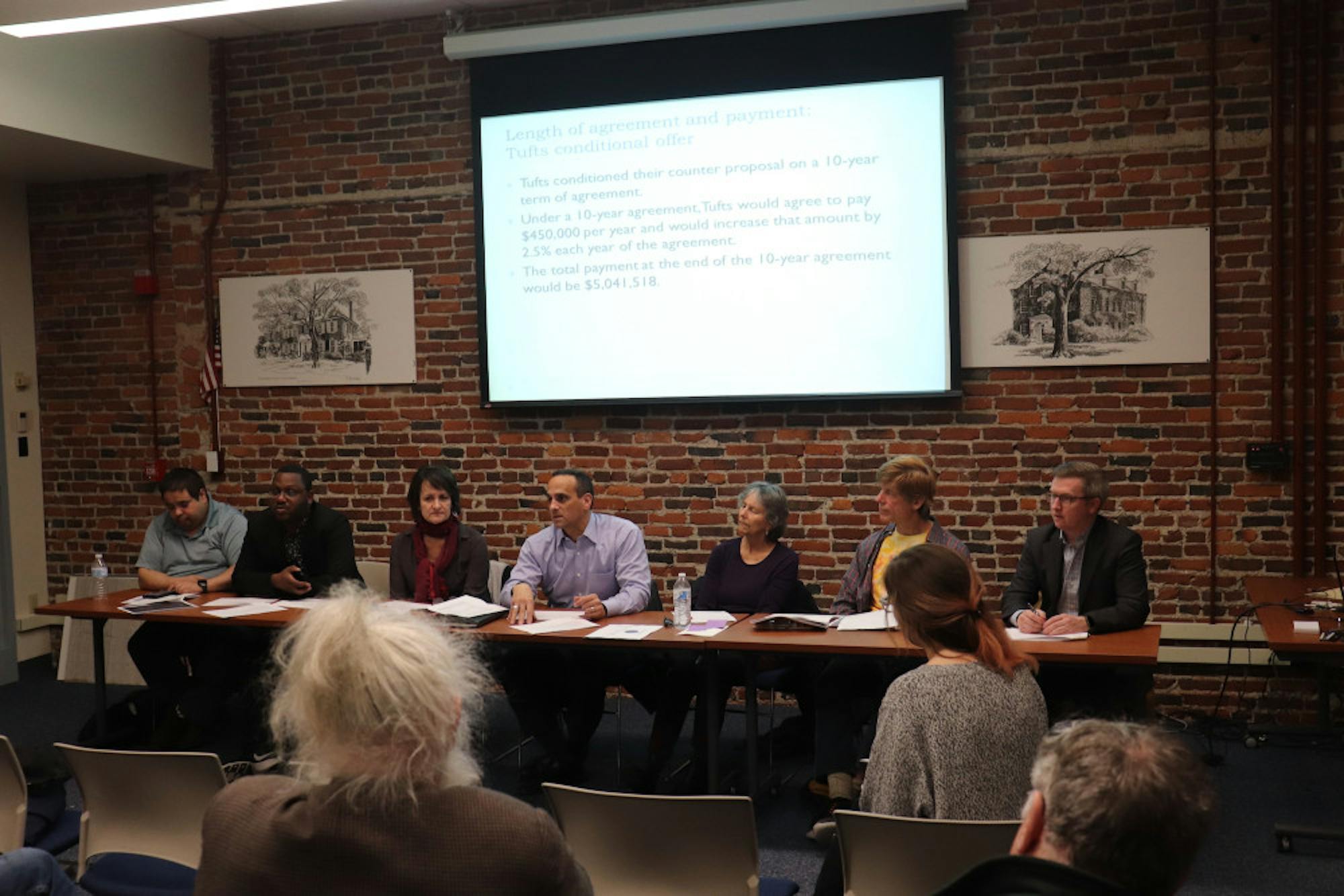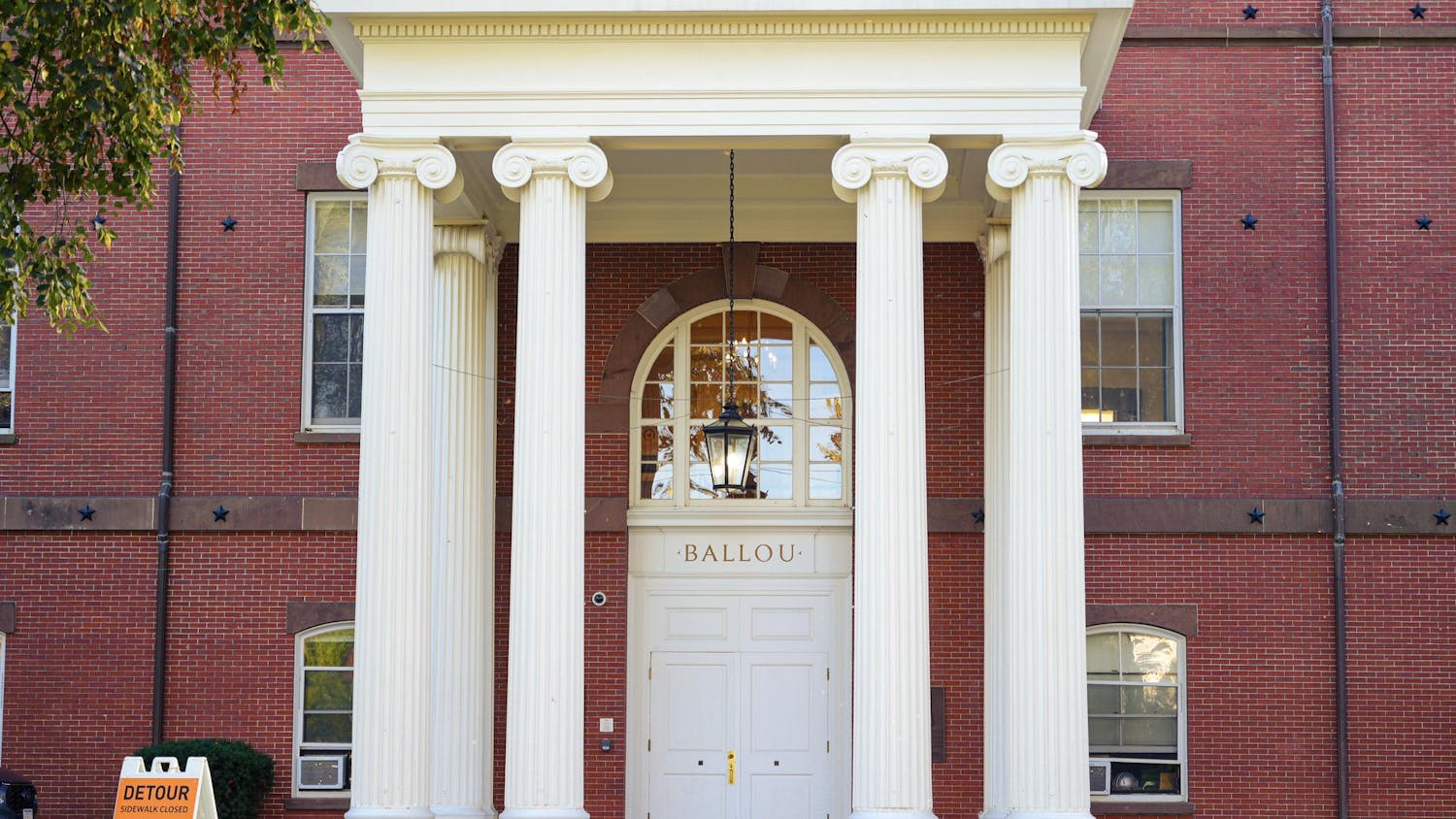After years of tension over housing and taxes, Tufts’ efforts to help its host communities respond to the coronavirus pandemic may have turned a new leaf in relations, raising hopes that warm feelings and the close partnership could endure even after the crisis is over.
At a community meeting 10 weeks ago, a Somerville resident suggested to Mayor Joe Curtatone that he sell the city’s portion of Tufts’ campus to Medford.
“I always joke we oughta make them a city unto themselves and let them come up with their own fire department and find out what the cost is,” another resident said.
At the meeting, which served as an update on the status of the negotiations over the payment in lieu of taxes (PILOT) program, Somerville residents and officials vented their frustrations with Tufts.
In a similar meeting on Oct. 29, the mayor took a tough line with the university, threatening that “all bets are off” if it did not make concessions in the talks. He called donations from the Sackler family “blood money.”
Last fall the City of Medford joined Somerville in pushing for state-level legislation that would force Tufts to provide development plans.
The complaints reflect years of simmering discontent in Medford and Somerville surrounding Tufts’ housing policy, use of city resources and PILOT payments.
Then came the COVID-19 pandemic.
On March 18, days after announcing the closure of campus, The Boston Globe published an op-ed by University President Anthony Monaco outlining a host of measures the university was taking to support hospitals and its neighboring communities. He wrote that the university would open its residence halls to quarantined patients and medical personnel, donate equipment and utilize Tufts experts.
“Tufts University is prepared to take these steps and has informed local health care leaders and the mayors of Somerville and Medford that they can count on us to help address their needs,” he wrote. He urged other universities to take similar measures.
He carried that message from insider outlets like the Massachusetts private colleges’ trade group podcast to prime time with an appearance on PBS' Amanpour and Company.
Curtatone lauded Monaco’s efforts.
“I have to give a big shout out to President Monaco and Tufts for leading, really by example, in how you utilize the campus and university resources in this type of crisis,” he said. “President Monaco has been a leader far out in front of any other academic leader in the country that I know of.”
Curtatone’s praise differs greatly from his tough rhetoric during the PILOT talks.
“In any passionate negotiation you have some inherent tension or conflict as a part of the process,” he said.
Tufts officials, led by the president and Rocco DiRico, the university’s director of government and community relations, began meeting with officials from Somerville and Medford in early March. Since then, the partnerships have blossomed along the lines laid out in Monaco’s op-ed.
Curtatone said the Somerville Department of Health and Human Services and the city’s incident response team meet regularly with Tufts’ crisis response team. Curtatone, Medford Mayor Breanna Lungo-Koehn and Monaco have a WhatsApp group chat where they text or speak by phone.
The partnerships yielded early results when the university signed contracts with Medford, Somerville and Cambridge Health Alliance to house first responders, health care workers and COVID-19 positive patients across campus.
Lungo-Koehn said in an April 30 interview that a Medford first responder had already used the housing in CoHo for a number of days.
“To have that option through the summer available to Medford is just a sigh of relief to know that if a first responder does need housing that they’re able to safely house on Tufts’ campus and protect their family, especially [a] family member that is vulnerable,” she said.
The housing agreement is not the only joint initiative the two sides have worked on. When Medford bought software for a program that monitors and assists vulnerable seniors, Tufts paid 80% of the cost, the mayor said. Tufts officials met with the city on May 1 to discuss plans to develop a contact-tracing application, and half a dozen Tufts students are already working for Medford as contact tracers.
“Between these seven or eight things Tufts is doing for Medford and Somerville, it’s pretty remarkable,” she said.
Tufts has also provided refrigerator space for Somerville food banks and suspended rent for its properties on Boston Avenue, according to DiRico and Natasha Perez, a spokeswoman for the City of Somerville.
Lungo-Koehn, who began her first term as mayor in January, said that the close collaboration with Tufts for pandemic response has made for an auspicious start to her relationship with the university.
“As mayor I’m starting on a really good footing with Tufts University and I’m happy with everything they’ve done, and I’m hoping this leads the way to further great negotiations on a PILOT program,” she said.
It's still unclear how the pandemic response will impact the underlying fault lines in the university’s relationship with its host communities.
PILOT, the money and services Tufts voluntarily provides Medford and Somerville in place of its full property tax obligation, is perhaps the most contentious of these as both cities have been negotiating new agreements for more than a year.
Tufts paid $450,000 to each city for fiscal year 2020, as it did the year before, though residents and elected officials have called the sum too low in the past.
Lungo-Koehn had just formed a new PILOT negotiation task force when the pandemic broke out, leading to the cancellation of the group’s first meeting. She intends to resume the talks when possible.
According to Katjana Ballantyn, the Somerville city councilor for Ward 7 and member of the PILOT negotiation team, Somerville’s talks are also “on pause.”
However, the same fundamental disagreements that have kept the two sides apart since last spring will still be present when the city and the university go back to the table, she said.
“[Housing] will still be an issue for certainly Somerville residents, because there’s an economic issue for people who are without work, concerned about whether they’re going to be able to pay their rent,” she said.
Curtatone acknowledged that there is work left to do on the agreement when talks resume, but said that collaboration on the coronavirus response already accomplished the underlying goal of the PILOT talks.
“The really orienting goal or value of the PILOT is to reaffirm in not just words the partnership between Tufts and its host communities,” he said. “I’d submit, unsolicited, what President Monaco and Tufts have been doing in the midst of this health emergency has done that.”






